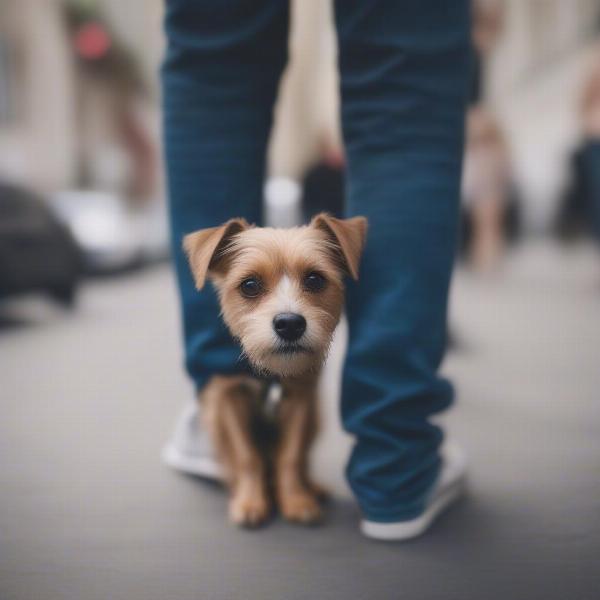The term “soft dog” is often used to describe a canine companion with a gentle and sensitive temperament. While not a specific breed, understanding what constitutes a “soft dog” can be incredibly helpful for potential owners looking for a loving and less boisterous pet. This article will delve into the characteristics of a soft dog, discuss training approaches, and offer advice on providing the best possible care for these gentle souls.
What exactly makes a dog “soft”? These dogs are generally characterized by their sensitivity to changes in their environment, their aversion to loud noises or harsh corrections, and their tendency to be more easily startled than other dogs. They are often described as being “velcro dogs” due to their desire to be close to their human companions and their need for constant reassurance. While they may not be as rambunctious as some other breeds, soft dogs offer unwavering loyalty and affection.
Recognizing a Soft Dog
Identifying a soft dog can sometimes be challenging, especially in puppies. However, some telltale signs can indicate a softer temperament. These include:
- Body Language: Often exhibiting submissive postures like lowered tail, averted gaze, and flattened ears.
- Reactions to Stimuli: Easily startled by sudden movements, loud noises, or unfamiliar people.
- Interaction with Other Dogs: Preferring calm interactions and avoiding rough play.
- Response to Correction: Becoming anxious or withdrawn when scolded.
 Soft dog hiding behind its owner
Soft dog hiding behind its owner
Training a Soft Dog
Training a soft dog requires a patient and gentle approach. Harsh corrections or punishment can be detrimental to their emotional well-being and can lead to fear-based behaviors. Positive reinforcement methods, such as rewarding desired behaviors with treats, praise, and affection, are highly effective. Consistency and creating a positive training environment are key to building trust and confidence in these sensitive dogs. Focus on short, positive training sessions to avoid overwhelming them.
Building Confidence in a Soft Dog
Building confidence in a soft dog is a crucial aspect of their development. Exposure to a variety of positive experiences in a controlled and safe environment can help them overcome their anxieties. Socialization with other calm and friendly dogs is also beneficial, as it allows them to learn appropriate canine interaction skills.
“Building a strong bond based on trust and mutual respect is the foundation for a successful training journey with a soft dog,” says renowned canine behaviorist, Dr. Emily Carter.
Caring for a Soft Dog
Soft dogs thrive in calm and predictable environments. Providing them with a safe and comfortable space, along with a consistent daily routine, can significantly reduce their anxiety levels. Enrichment activities like puzzle toys and gentle playtime can help keep them mentally stimulated and engaged.
(https://ilmdog.com/soft-dog-crates.html). The crate is placed in a cozy corner, giving the dog a sense of security.]
“Remember, a soft dog’s sensitivity is not a weakness, but a unique trait that requires understanding and empathy,” adds Dr. Carter. “Providing them with the right environment and training can unlock their full potential and create a truly fulfilling bond.”
toy soft dog breeds, while often considered soft, can also benefit from structured training and socialization just like larger breeds. Don’t underestimate their intelligence and capacity to learn.
Conclusion
Owning a soft dog can be a rewarding experience. Their gentle nature and unwavering loyalty make them wonderful companions. By understanding their unique needs and employing positive training methods, you can help your soft dog thrive and live a happy and fulfilling life. large soft dog kennel options can be especially beneficial for providing a secure and comfortable space for your soft dog to relax. Ensuring your soft dog’s wellbeing requires understanding, patience, and a gentle approach. Remember, their sensitivity is a strength, making them exceptional companions for those who appreciate their gentle souls.
FAQs
- Are soft dogs suitable for first-time owners? Yes, soft dogs can be great for first-time owners who are prepared to commit to positive reinforcement training methods and provide a calm environment.
- Do soft dogs need a lot of exercise? While they need regular exercise, soft dogs generally prefer less strenuous activities like leisurely walks or gentle playtime.
- How do I socialize a soft dog? Start with controlled introductions to calm and friendly dogs in a safe environment and gradually increase the complexity of social situations.
- Are soft dogs prone to anxiety? Yes, soft dogs can be prone to anxiety, so it’s important to provide them with a stable and predictable routine and avoid overwhelming them with new experiences.
- Can soft dogs be trained for competitive sports? While it’s possible, it’s important to respect their sensitivities and avoid putting them in stressful situations. Focus on activities they enjoy and that build their confidence.
- What are some good breeds for people looking for a soft dog? While “softness” isn’t breed-specific, breeds like Cavaliers, Greyhounds, and Golden Retrievers are often described as having gentle temperaments.
- How can I tell if my dog is a soft dog? Observe their body language, reactions to stimuli, and interaction with others. soft dog cage are a great way to provide a secure and comfortable space for your soft dog.
Related Articles:
About ILM Dog:
ILM Dog is your trusted global resource for expert advice on dog care and breeding. We offer practical guidance on everything from choosing the right breed to ensuring your dog’s health and well-being, covering topics such as training, nutrition, grooming, and even travel tips. Whether you’re a seasoned dog owner or just starting your journey, ILM Dog provides the knowledge and support you need. Contact us at [email protected] or +44 20-3965-8624 to learn more about how we can help you provide the best care for your furry friend.